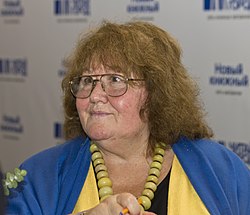Viktoriya Tokareva
| Viktoriya Tokareva | |
|---|---|

Tokareva in 2013
|
|
| Born | Viktoriya Samoilovna Tokareva 20 November 1937 Leningrad, Soviet Union |
| Occupation | Screenwriter and short story writer |
| Nationality | Soviet & Russian |
Viktoriya Samoilovna Tokareva (Russian: Виктория Самойловна Токарева) (born 20 November 1937) is a Soviet and Russian screenwriter and short story writer.
Viktoriya Tokareva was born in 1937 in Leningrad, in the Soviet Union. Her love for literature began at the age of twelve, when her mother read her "Skripka Rotschil'da," (“Rothschild’s Violin”), a short story by Chekhov. However, this love for literature did not immediately translate into a desire to be a writer – as a young woman, Tokareva initially applied to study medicine. When her application was rejected, she decided to study music instead, spending four years studying the piano at the Nikolai Rimsky-Korsakov Conservatory.
In this, too, Tokareva was unsuccessful. Realizing that she would never become a musician, she found work as a music teacher instead, in a school on the outskirts of Moscow. However, this did not suit her either, and Tokareva decided to become an actress, enrolling in the State Institute of Cinematography in 1963. It was here that she discovered her talent as a writer and found her niche as a screenwriter.
In her second year at the Institute, Tokareva published her first short story, “Den bez vran'ya,” or "A Day Without Lying,” in the literary magazine Molodaya Gvardiya. She has been writing steadily ever since. Her books to date include Happy End (1995), Vmesto menya (Instead of Me) (1995), and Loshadi s kryl'yami (Horses with Wings) (1996), and she has published often in the journals Novy mir and Yunost.
Tokareva’s characters tend to be ordinary people facing ordinary problems – people to whom her readers can easily relate. The majority of her characters are women, and as such she is regarded primarily as a women’s writer. Her writing can on occasion seem moralistic, upholding traditional values and gender roles, which has led to Western critics labeling her “pre-feminist.” Although she writes mainly in the realist tradition, she sometimes dips into what she calls "fantastic realism," weaving magical events into accounts of everyday lives.
...
Wikipedia
